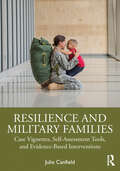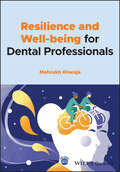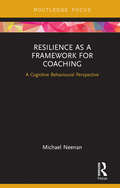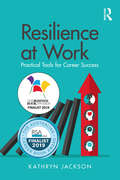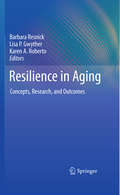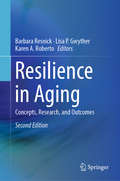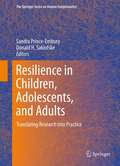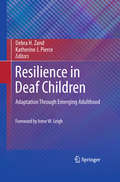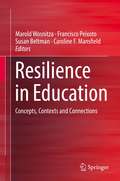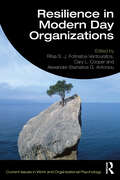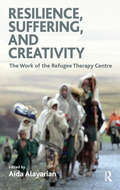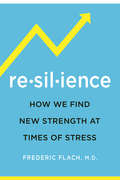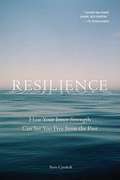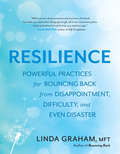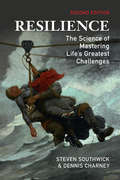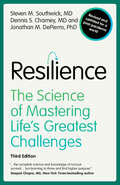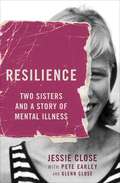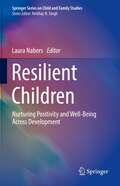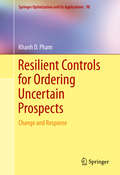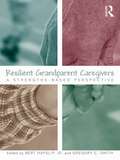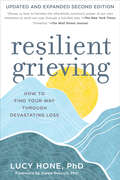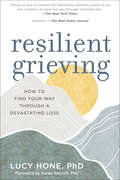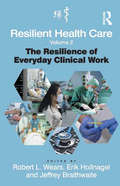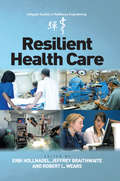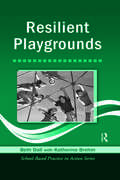- Table View
- List View
Resilience and Military Families: Case Vignettes, Self-Assessment Tools, and Evidence-Based Interventions
by Julie CanfieldThis textbook aims to educate students across all mental health disciplines on the importance of using strengths-based resilience as a tool when working with military families. Organized into three main sections using the military deployment cycle, including the stages of pre-deployment, deployment, and post-deployment, this textbook examines some of the key resiliency skills that operate in military families so that students can understand how many families not only survive, but learn how to thrive, during great challenges. Chapters address the military at home, resilient family systems, the importance of effective communication and social support, the impact of trauma and moral injury, and the transition from military to civilian life following service. Filled with case vignettes, self-assessment tools, and evidence-informed interventions, readers learn multiple ways to measure, assess, and strengthen family resiliency throughout the book. In addition to these skills, specific examples are highlighted that draw lessons from the military community on stress management and posttraumatic growth in the context of family life. The book finishes with an appendix that includes suggestions for therapists on the use of cultural humility to improve treatment.Following two decades of war and a global pandemic, this essential textbook is a crucial read for all mental health professionals training to work with miliary-connected populations and their families. Professionals from disciplines including clinical social work, marriage and family therapy, psychology, healthcare, and theology as well as instructors of courses on military social work, military psychology, and mental health will all find this text an invaluable resource.
Resilience and Well-being for Dental Professionals
by Mahrukh KhwajaResilience and Well-being for Dental Professionals Essential reading for dental professionals and other healthcare workers wanting to build emotional resilience and positive mental health Dentistry is a high-stress profession with elevated rates of anxiety, depression, burnout, suicidal thoughts and self-harm. Chronic workplace stress is a growing concern as it can severely damage the mental health of dental professionals and negatively impact their ability to provide appropriate care. Psychological interventions have been shown to greatly benefit the well-being and emotional resilience of the medical and healthcare community, yet resources that provide preventative tools are limited. Resilience and Well-being for Dental Professionals, is designed not only to combat occupational hazards in Dentistry, such as burnout and compassion fatigue, but also to build resilience, engagement at work and nurture positive mental health through a variety of evidence-based tools. This invaluable guide helps readers utilise tools from the science of well-being (Positive Psychology, Mindfulness, Cognitive Behavioural Therapy and Acceptance and Commitment Therapy), to create happier, thriving careers. It includes: Tools from resilience interventions to help dental professionals implement preventative habits and take steps towards positive mental health Focus on self awareness in recognizing burnout early Positive psychology and well-being exercises, customised for dental professionals, to help you meld together research and application: from journaling and creative exercises to nature-based and activities at work Measure and track well-being using psychological scales Manage difficult emotions, practice mindfulness and self-compassion, develop a culture of kindness and gratitude at work, utilise a growth mindset when upskilling, harness positive leadership and use strengths, with patients and at home Create habits that stick through applying the psychology of goal setting, behaviour change, motivation psychology, work-life harmony and happiness Written by a Positive Psychologist, and Dentist, with more than 12 years’ clinical dentistry experience within a stressful NHS environment, Resilience and Well-being for Dental Professionals is a must-have resource for all dental students, hygienists, therapists, dentists, dental nurses, dental technicians, specialists and allied healthcare workers.
Resilience as a Framework for Coaching: A Cognitive Behavioural Perspective (Routledge Focus on Coaching)
by Michael NeenanIn Resilience as a Framework for Coaching: A Cognitive Behavioural Perspective, Michael Neenan presents an in-depth understanding of resilience and shows how coaches can help their clients to develop and enhance their own resilience. By focusing on the beliefs, emotions and behaviours that promote or hinder the development of resilience, Neenan provides coaches with plenty of discussion points for inclusion in their sessions. The book, written in an engaging and accessible style, includes a chapter showing the unfolding of a five-session course of resilience coaching with lengthy dialogue excerpts between the coach and the client, accompanied by a commentary on the coach’s interventions. Throughout the book there are plenty of case studies and examples of resilience in action. The book ends with a recap on resilience pinpointing some of the key features of a resilient mindset. Written by an established expert in the field of resilience and cognitive behavioural coaching, Resilience as a Framework for Coaching represents an essential resource for those wishing to train in this discipline. The book will appeal to coaches, coaching psychologists, psychotherapists and clinical, health and counselling psychologists with an interest in coaching, human resource professionals, counsellors and trainees in these disciplines.
Resilience at Work: Practical Tools for Career Success
by Kathryn JacksonShortlisted for the 2019 Business Book Awards in the International Business Book category The world of work is in a constant state of flux. Resilience at Work: Practical Tools for Career Success is an essential guide to maintaining resilience in this ever-changing environment, whether you are working in a turbulent field, navigating the job market or simply trying to realise your career ambitions. Based on the author’s own experience of working under extreme circumstances in post-earthquake Christchurch, New Zealand and enhanced by collaboration with leading resilience experts from around the world, this book is packed with stories, resources and personal coaching to support you to: learn about the importance of emotional honesty as a foundation for true resilience explore how your levels of self-care influence your ability to re-energise and stay strong consider how having the right sort of connections play a part in your ability to flourish reflect on how you have been learning (and changing) along your journey to resilience This is an invaluable resource for organisations looking to support employees by giving them the tools for self-managed resilience at work. It is also ideal for career coaches, counsellors and other professionals who are working with clients facing their own crisis of resilience, whether they are starting out or well-advanced on their career journey. Kathryn Jackson’s unique coaching style enables readers to truly personalise the approach they choose to take, using the stories, the frameworks and the research to create a unique voyage towards building Resilience at Work.
Resilience in Aging
by Karen A. Roberto Barbara Resnick Lisa P. GwytherThe many significant technological and medical advances of the 21st century cannot overcome the escalating risk posed to older adults by such stressors as pain, weakness, fatigue, depression, anxiety, memory and other cognitive deficits, hearing loss, visual impairment, isolation, marginalization, and physical and mental illness. In order to overcome these and other challenges, and to maintain as high a quality of life as possible, older adults and the professionals who treat them need to promote and develop the capacity for resilience, which is innate in all of us to some degree. The purpose of this book is to provide the current scientific theory, clinical guidelines, and real-world interventions with regard to resilience as a clinical tool. To that end, the book addresses such issues as concepts and operationalization of resilience; relevance of resilience to successful aging; impact of personality and genetics on resilience; relationship between resilience and motivation; relationship between resilience and survival; promoting resilience in long-term care; and the lifespan approach to resilience. By addressing ways in which the hypothetical and theoretical concepts of resilience can be applied in geriatric practice, Resilience in Aging provides inroads to the current knowledge and practice of resilience from the perspectives of physiology, psychology, culture, creativity, and economics. In addition, the book considers the impact of resilience on critical aspects of life for older adults such as policy issues (e.g., nursing home policies, Medicare guidelines), health and wellness, motivation, spirituality, and survival. Following these discussions, the book focuses on interventions that increase resilience. The intervention chapters include case studies and are intended to be useful at the clinical level. The book concludes with a discussion of future directions in optimizing resilience in the elderly and the importance of a lifespan approach to aging.
Resilience in Aging: Concepts, Research, and Outcomes
by Karen A. Roberto Barbara Resnick Lisa P. GwytherThis updated and expanded second edition of Resilience in Aging offers a comprehensive description of the current state of knowledge with regard to resilience from physiological (including genetic), psychological (including cognitive and creative), cultural, and economic perspectives. In addition, the book considers the impact of resilience on many critical aspects of life for older adults including policy issues, economic, cognitive and physiological challenges, spirituality, chronic illness, and motivation. The only book devoted solely to the importance and development of resilience in quality of life among older adults, Resilience in Aging, 2nd Edition continues to offer evidence-based theory, clinical guidelines, and new and updated case examples and real-world interventions so professional readers can make the best use of this powerful tool. The critical insights in this volume are concluded with a discussion of future directions on optimizing resilience and the importance of a lifespan approach to the critical component of aging. The book’s coverage extends across disciplines and domains, including: Resilience and personality disorders in older age.Cultural and ethnic perspectives on enhancing resilience in agingSustained by the sacred: religious and spiritual factors for resilience in adulthood and aging.Building resilience in persons with early-stage dementia and their care partners.Interdisciplinary geriatric mental health resilience interventions.Developing resilience in the aged and dementia care workforce.Using technology to enhance resilience among older adults. This wide-ranging and updated lifespan approach gives Resilience in Aging, 2nd Edition particular relevance to the gamut of practitioners in gerontology and geriatrics, including health psychologists, neuropsychologists, clinical psychologists, psychiatrists, social workers, geriatricians, family physicians, nurses, occupational and physical therapists, among others.
Resilience in Children, Adolescents, and Adults
by Donald H. Saklofske Sandra Prince-EmburyResilience in Children, Adolescents, and Adults: Translating Research into Practice recognizes the growing need to strengthen the links between theory, assessment, interventions, and outcomes to give resilience a stronger empirical base, resulting in more effective interventions and strength-enhancing practice. This comprehensive volume clarifies core constructs of resilience and links these definitions to effective assessment. Leading researchers and clinicians examine effective scales, questionnaires, and other evaluative tools as well as instructive studies on cultural considerations in resilience, resilience in the context of disaster, and age-appropriate interventions. Key coverage addresses diverse approaches and applications in multiple areas across the lifespan. Among the subject areas covered are: - Perceived self-efficacy and its relationship to resilience. - Resilience and mental health promotion in the schools. - Resilience in childhood disorders. - Critical resources for recovering from stress. - Diversity, ecological, and lifespan issues in resilience. - Exploring resilience through the lens of core self-evaluation. Resilience in Children, Adolescents, and Adults is an important resource for researchers, clinicians and allied professionals, and graduate students in such fields as clinical child, school, and developmental psychology, child and adolescent psychiatry, education, counseling psychology, social work, and pediatrics.
Resilience in Deaf Children
by Katherine J. Pierce Debra H. Zand<P>Historically, the diagnosis of deafness in a child has been closely associated with profound disability, including such typical outcomes as unmet potential and a life of isolation. A major shift away from this negative view has led to improved prospects for deaf children. <P>Resilience in Deaf Children emphasizes not only the capability of deaf individuals to withstand adversity, but also their positive adaptation through interactions with parents, peers, school, and community. In this engaging volume, leading researchers and professionals pay particular attention to such issues as attachment, self-concept, and social competence, which are crucial to the development of all young people. In addition, the volume offers strategies for family members, professionals, and others for promoting the well-being of deaf children and youth. <P>Coverage includes: <br>Attachment formation among deaf infants and their primary caregivers.<br>Deaf parents as sources of positive development and resilience for deaf infants.<br>Enhancing resilience to mental health disorders in deaf school children.<br>Strength-based guidelines for improving the developmental environments of deaf children and youth.<br>Community cultural wealth and deaf adolescents' resilience.<br>Self-efficacy in the management of anticipated work-family conflict as a resilience factor among young deaf adults.<br>Resilience in Deaf Children is essential reading for researchers, clinicians, and graduate students in clinical child, school, and developmental psychology as well as for allied researchers and professionals in such disciplines as school counseling, occupational therapy, and social work.
Resilience in Education: Concepts, Contexts and Connections
by Marold Wosnitza Francisco Peixoto Susan Beltman Caroline F. MansfieldThis volume focuses on resilience in educational contexts which has emerged as an important field of research, with recent investigation into resilience of school students teachers, and post-secondary students and staff. The book integrates theoretically diverse viewpoints and research advancing relevant theory. It furthermore presents interventions which aim enhancing resilience in the educational context. The interplay between more basic research and actual practice in the classroom, university or workplace enriches relevant theory and research. Each chapter includes an explanation of how resilience is conceptualized in the research and the methods used to examine resilience. The chapters also provide a description of the context in which the research was conducted and how particular aspects of context influence the resilience process. Innovative approaches to exploring resilience are highlighted as well as directions for future research.
Resilience in Modern Day Organizations (Current Issues In Work And Organizational Psychology Ser.)
by Cary L. Cooper Fotinatos-Ventouratos, Ritsa S. J. Antoniou, Alexander-Stamatios G.This international and thought-provoking volume addresses both theoretical and conceptual issues of resilience in modern organizations, looking at areas of concern and providing suggestions for future preventative measures. In recent years, organizations across the world have been subjected to major upheavals as several crises, including the COVID-19 pandemic, the World Economic Crisis, and the Migratory Crisis, have contributed to the changing landscape of work. Individuals, organizations, and societies have been forced to re-think, re-adjust, and re-align in the face of adversity. The “survivors” of such upheavals are those who come to grips with the new realities of our times and encompass resilience in its entirety. This timely collection assesses resilience on critically important variables, such as socio-economic status, occupational type, and gender differences, and highlights preventative measures that organizations and individuals should take to maximise wellbeing and adjustment in these everchanging and challenging times. Essential reading for students, scholars, practitioners, and policy makers, this volume sheds light on the multi-faceted ways to enhance the resilience paradigm and offers insights into implications for future research in the area.
Resilience, Suffering and Creativity: The Work of the Refugee Therapy Centre
by Aida AlayarianThe trauma of refugee status is particularly corrosive. It does the usual harm of devastating our own self-image and sense of permanence in the world, but it does more. It is a dislocation from our familiar domestic geography and culture, and that must wrench from our grasp all the external markers by which we know ourselves and our worth. The threat of persecution, torture, and death is aimed at a complete destabilization. The result is a complex of anxieties that add up to far more than simple suffering. If therapy is primarily aimed at the gentle exposure of one's worst fears, then what purchase can it have on this most ungentle process of becoming a refugee?
Resilience: How We Find New Strength At Times of Stress (A\self-help Classic Ser.)
by Frederic FlachLearn to bounce back from life's inevitable crises by making friends with stress.There's no escaping stress. It appears on our doorstep uninvited in the shattering forms of death and divorce, or even in the pleasant experiences of promotion, marriage, or a long-held wish fulfilled. Anything that upsets the delicate balance of our daily lives creates stress. So why do some people come out of a crisis while others never seem quite themselves again? Now, Dr. Frederic Flach takes the anxiety out of hard times by showing you how to embrace you fears and become stronger because of them. Drawing on over thirty years of experience, Flach reveals the remarkable antidote to the destructive qualities of stress: RESILIENCE.
Resilience: How Your Inner Strength Can Set You Free from the Past
by Boris CyrulnikOne out of every two people will experience trauma, says psychiatrist Boris Cyrulnik, and one in ten will remain a prisoner of that suffering. Why are some children permanently damaged by difficult childhoods, while others grow up into secure, creative, loving adults? This book, based on Dr. Cyrulnik's broad experience with victims of childhood distress, offers a message of hope for everyone concerned about the impact of deprivation and such traumatic events as separation, emotional or sexual abuse, and violence in the environment. The ghosts of the past keep on whispering to the child within the adult. Through dozens of moving, vivid examples, Dr. Cyrulnik describes the ingredients of resilience, the ability to heal the wounded self and move on, to make sense of what happened back then and form new emotional and social ties. Affection is such a vital need, he writes, that those who were deprived of it will attach themselves intensely to anything that rekindles a spark of life, whatever the cost. From the earliest parent-child bonding to the sexual turbulence of the teenage years, this book shows what makes for success or failure in the struggle to gain freedom from early pain.
Resilience: Powerful Practices for Bouncing Back from Disappointment, Difficulty, and Even Disaster
by Linda GrahamWhether it&’s a critical comment from the boss or a full-blown catastrophe, life continually dishes out challenges. Resilience is the learned capacity to cope with any level of adversity, from the small annoyances of daily life to the struggles and sorrows that break our hearts. Resilience is essential for surviving and thriving in a world full of troubles and tragedies, and it is completely trainable and recoverable — when we know how. In Resilience, Linda Graham offers clear guidance to help you develop somatic, emotional, relational, and reflective intelligence — the skills you need to confidently and effectively cope with life&’s inevitable challenges and crises.
Resilience: The Science Of Mastering Life's Greatest Challenges
by Dennis S. Charney Steven M. SouthwickMany of us will be struck by one or more major traumas sometime in our lives. Perhaps you have been a victim of sexual abuse, domestic violence or assault. Perhaps you were involved in a serious car accident. Perhaps you are a combat veteran. Maybe you were on the beach in Thailand during a tsunami, or in New Orleans during Hurricane Katrina. Or maybe, you are among the millions who have suffered a debilitating disease, lost a loved one or lost your job. <P><P>This inspiring book identifies ten key ways to weather and bounce back from stress and trauma. <P>Incorporating the latest scientific research and dozens of interviews with trauma survivors, it provides a practical guide to building emotional, mental and physical resilience. Written by experts in post-traumatic stress, this book provides a vital and successful roadmap for overcoming the adversities we all face at some point in our lives.<P> Covers ten key resilience factors, optimism, moral compass, role models, religion and physical training, bringing hope and inspiration for overcoming adversity.<P> First-person interviews with trauma survivors enable learning from real-life examples of how to face your fears, gain strength and grow as a result of difficult experiences.<P> Provides recommendations for building resilience based on sound scientific knowledge.
Resilience: The Science of Mastering Life's Greatest Challenges
by Dennis S. Charney Steven M. Southwick Jonathan M. DePierroLife presents us all with challenges. Most of us at some point will be struck by major traumas such as the sudden death of a loved one, a debilitating disease, or a natural disaster. What differentiates us is how we respond. In this important book, three experts in trauma and resilience answer key questions such as What helps people adapt to life's most challenging situations?, How can you build up your own resilience?, and What do we know about the science of resilience? Combining cutting-edge scientific research with the personal experiences of individuals who have survived some of the most traumatic events imaginable, including the COVID-19 pandemic, this book provides a practical resource that can be used time and time again. The experts describe ten key resilience factors, including facing fear, optimism, and relying on role models, through the experiences and personal reflections of highly resilient survivors. Each resilience factor will help you to adapt and grow from stressful life events and will bring hope and inspiration for overcoming adversity.
Resilience: Two Sisters and a Story of Mental Illness
by Pete Earley Glenn Close Jessie CloseAt a young age, Jessie Close struggled with symptoms that would transform into severe bipolar disorder in her early twenties, but she was not properly diagnosed until the age of fifty. Jessie and her three siblings, including actress Glenn Close, spent many years in the Moral Re-Armament cult. Jessie passed her childhood in New York, Switzerland, Connecticut, Zaire (now the Democratic Republic of Congo), and finally Los Angeles, where her life quickly became unmanageable. She was just fifteen years old.Jessie's emerging mental illness led her into a life of addictions, five failed marriages, and to the brink of suicide. She fought to raise her children despite her ever worsening mental conditions and under the strain of damaged romantic relationships. Her sister Glenn and certain members of their family tried to be supportive throughout the ups and downs, and Glenn's vignettes in RESILIENCE provide an alternate perspective on Jessie's life as it began to spiral out of control. Jessie was devastated to discover that mental illness was passed on to her son Calen, but getting him help at long last helped Jessie to heal as well. Eleven years later, Jessie is a productive member of society and a supportive daughter, mother, sister, and grandmother. In RESILIENCE, Jessie dives into the dark and dangerous shadows of mental illness without shying away from its horror and turmoil. With New York Times bestselling author and Pulitzer Prize finalist Pete Earley, she tells of finally discovering the treatment she needs and, with the encouragement of her sister and others, the emotional fortitude to bring herself back from the edge.
Resilient Children: Nurturing Positivity and Well-Being Across Development (Springer Series on Child and Family Studies)
by Laura NaborsThis book examines resilience in childhood, focusing on positive functioning and development, often in the face of everyday difficulties and adversities. It highlights critical areas in which children and their families can demonstrate resilience and attain positive social, emotional, academic, and behavioral life trajectories. The book describes key factors related to enhancing resilience for children, such as positive relationships with adults, positive school environments, and meaningful connections with others. It provides practical guidelines for promoting resilience in youth and reviews the critical nature of resilience across various situations, critical issues, and different developmental periods. It offers guidance on strategies for fostering resilience in children.Key topics featured include:Raising children to have grit and tenacity.Fostering resilience in children at school and within their families.Nurturing resilience in children with chronic illnesses and posttrauma.Resilient Children is an essential resource for researchers, professors, and graduate students as well as clinicians, therapists, and other professionals in developmental, clinical, and school psychology, family studies, public health, and social work as well as all related disciplines, including educational psychology, child and adolescent psychiatry, and pediatrics.
Resilient Controls for Ordering Uncertain Prospects
by Khanh D. PhamProviding readers with a detailed examination of resilient controls in risk-averse decision, this monograph is aimed toward researchers and graduate students in applied mathematics and electrical engineering with a systems-theoretic concentration. This work contains a timely and responsive evaluation of reforms on the use of asymmetry or skewness pertaining to the restrictive family of quadratic costs that have been appeared in various scholarly forums. Additionally, the book includes a discussion of the current and ongoing efforts in the usage of risk, dynamic game decision optimization and disturbance mitigation techniques with output feedback measurements tailored toward the worst-case scenarios. This work encompasses some of the current changes across uncertainty quantification, stochastic control communities, and the creative efforts that are being made to increase the understanding of resilient controls. Specific considerations are made in this book for the application of decision theory to resilient controls of the linear-quadratic class of stochastic dynamical systems. Each of these topics are examined explicitly in several chapters. This monograph also puts forward initiatives to reform both control decisions with risk consequences and correct-by-design paradigms for performance reliability associated with the class of stochastic linear dynamical systems with integral quadratic costs and subject to network delays, control and communication constraints.
Resilient Grandparent Caregivers: A Strengths-Based Perspective
by Jr. Bert Hayslip Gregory C. SmithThe study of grandparents raising grandchildren, now almost two decades old, has tended to have a negative bias, emphasizing the difficulties such people face and the negative impact that grandparent caregiving has on them physically, socially, and emotionally. This edited book seeks to reverse this trend by taking a positive approach to understanding grandparent caregivers, focusing on their resilience and resourcefulness. This method reflects a strengths-based approach and the importance of benefit-finding and positive coping. Chapters feature information from both qualitative and quantitative studies and are written by a diverse range of professionals, such as counselors, psychologists, geriatric social workers, and nurse practitioners, to provide multidisciplinary persepctives for practitioners working with grandparent caregivers. Part one discusses the positive qualities that custodial grandparents possess – resilience, resourcefulness, and benefit finding. The second part considers the sociocultural aspects of resilience and resourcefulness in grandparent caregivers. Finally, part three presents strengths-based interventions for working with custodial grandparents. Practitioners will find this to be a valuable resource in their work and the field as a whole, stimulating positive changes in attitudes toward and practices with grandparent caregivers.
Resilient Grieving, Second Edition (Second Edition): How To Find Your Way Through A Devastating Loss
by Lucy HoneThe loss of someone you hold dear may be beyond your control; being paralyzed by grief is not. In 2014, Dr. Lucy Hone, the trailblazer in the field of Resilient Grieving, was faced with her own inescapable sorrow after her twelve-year-old daughter was killed in a car accident. By developing—and following—the strategies of Resilient Grieving shared here, she found a proactive way to manage her grief, embrace life again, and discover profound meaning. In this completely updated and expanded second edition, she continues to shift the narrative on how to grieve. With new scientific evidence, Dr. Hone demonstrates the inadequacy and potential harm of Kübler-Ross’s Five Stages model of grief. In its place, Dr. Hone shares the best of contemporary grief advice—offering tools to handle emotions, manage relationships, and get the support you need—replacing helplessness with hope and a sense of control. Here, also, are all-new, practical insights into how to keep your loved one’s memory alive. Dr. Hone has never been more convinced that the tools of Resilient Grieving can transform the ways that readers approach grief, helping them draw on their innate ability to cope with loss and become active participants in their grief journey—and, in time, get back to living happy, healthy, meaningful lives, just as she has done.
Resilient Grieving: How To Find Your Way Through A Devastating Loss
by Lucy HoneResilient Grieving offers an empowering alternative to the five stages of grief—and makes clear our capacity for growth following the trauma of a loss that changes everything As heard on NPR’s Hidden Brain and CBS News The death of someone we hold dear may be inevitable; being paralyzed by our grief is not. Recent research has revealed our capacity for resilient grieving, our innate ability to respond to traumatic loss by finding ways to grow—by becoming more engaged with our lives, and discovering new, profound meaning. Author and resilience/well-being expert Lucy Hone, a pioneer in positive psychology and bereavement research, was faced with her own inescapable sorrow when, in 2014, her 12-year-old daughter was killed in a car accident. By following the strategies of resilient grieving, she found a proactive way to move through her grief, and, over time, embrace life again. “This book aims to help you relearn your world . . . to help you navigate the grieving process as best you can—without hiding from your feelings or denying the reality, or significance, of your loss.”—from Resilient Grieving
Resilient Health Care, Volume 2: The Resilience of Everyday Clinical Work (Ashgate Studies in Resilience Engineering)
by Robert L. Wears Erik HollnagelHealth systems everywhere are expected to meet increasing public and political demands for accessible, high-quality care. Policy-makers, managers, and clinicians use their best efforts to improve efficiency, safety, quality, and economic viability. One solution has been to mimic approaches that have been shown to work in other domains, such as quality management, lean production, and high reliability. In the enthusiasm for such solutions, scant attention has been paid to the fact that health care as a multifaceted system differs significantly from most traditional industries. Solutions based on linear thinking in engineered systems do not work well in complicated, multi-stakeholder non-engineered systems, of which health care is a leading example. A prerequisite for improving health care and making it more resilient is that the nature of everyday clinical work be well understood. Yet the focus of the majority of policy or management solutions, as well as that of accreditation and regulation, is work as it ought to be (also known as ’work-as-imagined’). The aim of policy-makers and managers, whether the priority is safety, quality, or efficiency, is therefore to make everyday clinical work - or work-as-done - comply with work-as-imagined. This fails to recognise that this normative conception of work is often oversimplified, incomplete, and outdated. There is therefore an urgent need to better understand everyday clinical work as it is done. Despite the common focus on deviations and failures, it is undeniable that clinical work goes right far more often than it goes wrong, and that we only can make it better if we understand how this happens. This second volume of Resilient Health Care continues the line of thinking of the first book, but takes it further through a range of chapters from leading international thinkers on resilience and health care. Where the first book provided the rationale and basic concepts of RHC, the Resilience of Everyday Clinical Work b
Resilient Health Care: The Resilience Of Everyday Clinical Work (Ashgate Studies in Resilience Engineering)
by Jeffrey Braithwaite Erik HollnagelHealth care is everywhere under tremendous pressure with regard to efficiency, safety, and economic viability - to say nothing of having to meet various political agendas - and has responded by eagerly adopting techniques that have been useful in other industries, such as quality management, lean production, and high reliability. This has on the whole been met with limited success because health care as a non-trivial and multifaceted system differs significantly from most traditional industries. In order to allow health care systems to perform as expected and required, it is necessary to have concepts and methods that are able to cope with this complexity. Resilience engineering provides that capacity because its focus is on a system’s overall ability to sustain required operations under both expected and unexpected conditions rather than on individual features or qualities. Resilience engineering’s unique approach emphasises the usefulness of performance variability, and that successes and failures have the same aetiology. This book contains contributions from acknowledged international experts in health care, organisational studies and patient safety, as well as resilience engineering. Whereas current safety approaches primarily aim to reduce or eliminate the number of things that go wrong, Resilient Health Care aims to increase and improve the number of things that go right. Just as the WHO argues that health is more than the absence of illness, so does Resilient Health Care argue that safety is more than the absence of risk and accidents. This can be achieved by making use of the concrete experiences of resilience engineering, both conceptually (ways of thinking) and practically (ways of acting).
Resilient Playgrounds (School-Based Practice in Action)
by Beth Doll Katherine BrehmWhile recess provides children with a time to play and take a break from the school day, research has shown that it is also a necessary and vital part of their social, emotional, and academic development. This book provides tools and strategies for school mental health professionals, teachers, and administrators to evaluate and improve the recess experience in order to ensure that children benefit as much as possible from this important time. Using a data-based problem solving strategy, the author presents methods for assessing playgrounds, identifying features that may negatively impact students and their social interactions, intervening to modify and strengthen these features, and monitoring to guarantee that the interventions have created successful outcomes. An accompanying CD contains forms, examples, PowerPoint presentations, and other resources to support the procedures discussed throughout the book.
